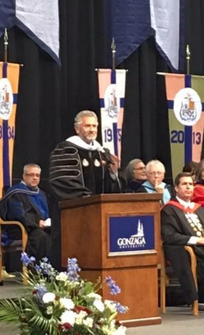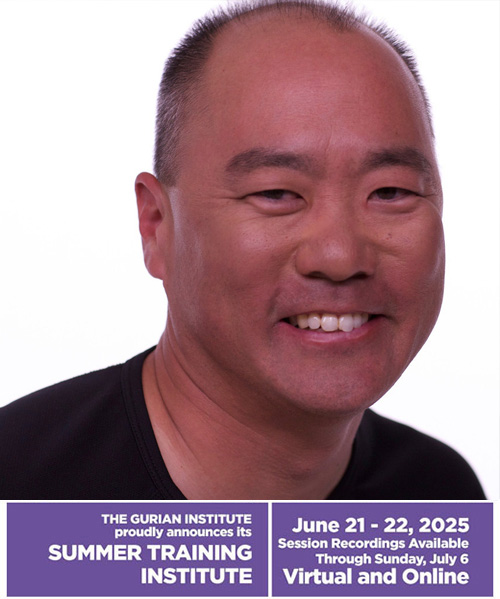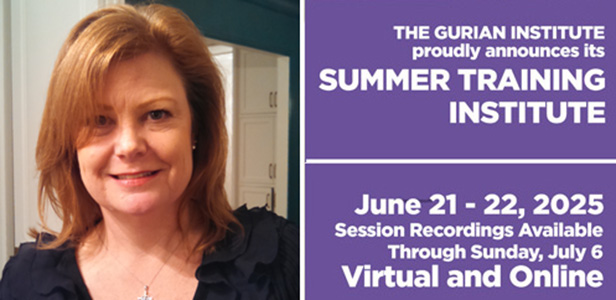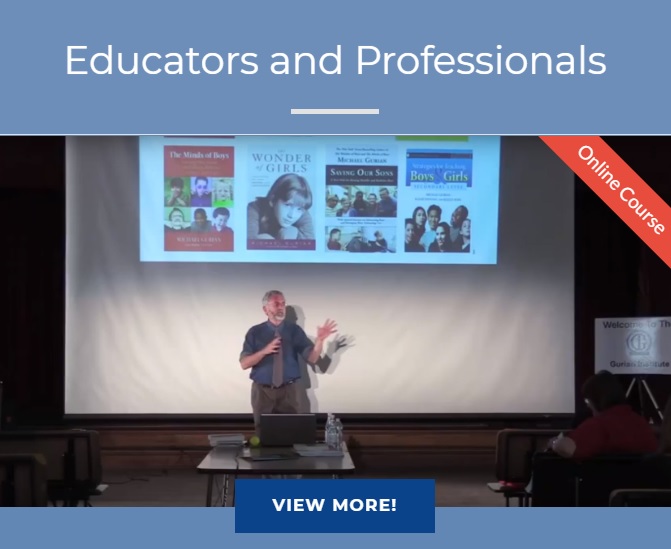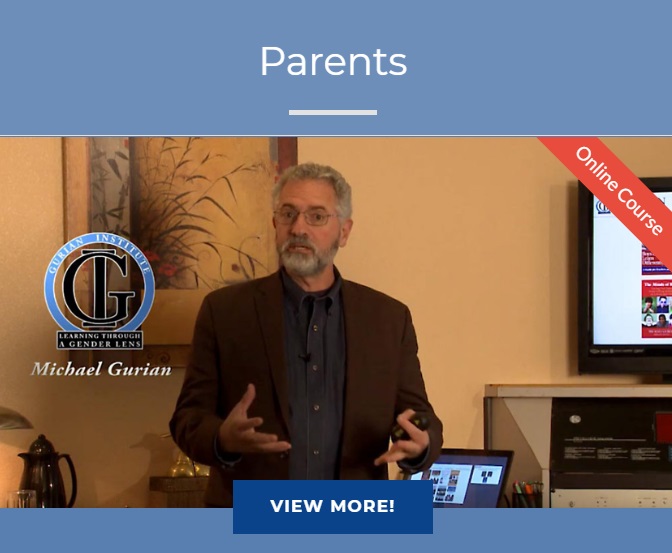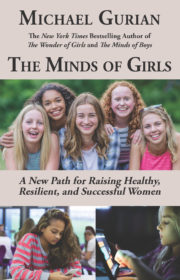Dr. Michael Gurian recieved an honorary doctor of letters in recognition of his contributions to gender neuroscience and efforts to improve education for children in disadvantaged communities this past weekend. His connections to Gonzaga began as a student, evolved as a faculty member and continued through the nonprofit Gurian Foundation he co-founded.
Gurian, as a social philosopher and consultant over the past 25 years, has traveled extensively to colleges, schools, and conferences to bring gender science into multiple environments and public policy. The Gurian Institute conducts international research and instructs professionals in gender science. A number of his books have sparked international debate, including “The Wonder of Boys,” “The Wonder of Girls,” “Boys and Girls Learn Differently,” and “Leadership and the Sexes.”
Read on for Dr. Michael Gurian’s, Commencement Address, for Gonzaga University Graduate Schools Graduation that he delivered on May 7, 2016.
Hello everyone! Congratulations on the honors and degrees you’ve received. Thank you, Dr. McCulloh and each member of the Commencement Committee, for asking me to speak today, and for giving me an Honorary Doctor of Letters. I am truly and deeply honored. My deepest gratitude, also, to all of my Gonzaga mentors, and to my family—you have made my life possible.
When Dr. McCulloh asked me to offer some remarks I responded, “Are you kidding—you want me? What do I know?” He was patient. “Yes, we want you. Tell us what you’ve learned since you left graduate school; what you wish someone had told youat this moment of life. And please do it in 12 minutes or less.” Sage advice! I promise to stick to the timeline.
On a day shortly after I had completed my graduate program, I sat at the edge of Lake Pend ’Oreille. I remember hearing the honking of Canadian geese. As I turned toward them I saw their V approaching then disturbing the water as they dropped into it. These dozen or so geese lingered there, washing and grooming themselves until a boat came charging. Most of the geese flew upward—honking, flapping, chaotic until they could re-order the air again, but one goose sat courageously in the water, curious to meet the huge bird coming at it. Only when the boat hit its tail did the goose rise awkwardly upward and flap around until its wings found air currents to support them.
I remember this vividly because I was struck by how long that goose stayed in the churning, chaotic water; it suggested openness to a new kind of love. I think it reflected my graduate school experience. I was always a bit of a misfit, a wounded boy, a worried man, a spiritual searcher—not making the same decisions the rest of the flock seemed to be making. I left grad school with a fear of being consumed in other people’s certainties, their forms, their ideologies. I had a strong and awkward will to work my way back towards some whole greater than any perfect certainty.
This passion took me into the gender world—the study of women and men, and boys and girls. Before I knew it, I was back at Gonzaga developing a course in gender psychology that used brain scans to show gender in the brains of females, males, and the whole gender spectrum. As I researched and wrote my fourth book, The Wonder of Boys, I became the lone goose again: academic opinion of that time felt certain boys were fine, only girls were victims, but my studies showed all children could suffer–one gender did not have it easier than the other in the whole, though in certain parts, each gender did.
In the late 1990s, as the Gurian Institute formed, growing research in brain science allowed me to transcend limiting ideology and discover my own way of caring for not just one group of children but all children. But, again, I became the awkward goose in the water awaiting the wallop of that boat! The majority of academics argued that gender was wholly socialized, not brain-related. Even today, this ideological opinion trumps the natural sciences in much academic conversation, and so, many of the sufferings of both boys and girls are not healed.
All this to say–though my specific area of focus is gender, you, too, will encounter your moments of awkward, anti-establishment thinking; you’ll linger waiting for the bam! before you soar. Or, let me say, I hope you will. I hope you’ll take the risk of breathing the deep breath of the impossible as you pursue your vision. This is what I wish someone had told me thirty years ago: to succeed and serve others we need our misfit awkwardness just as much as our distinctive beauty.
We have to let life teach us who we are by engaging accepted certainties then tossing them out when we have evidence of something better. It is in this way that we sing the song we are each born for. This song—your life-work—will be your way of creating revelation. No matter your field or role in life, you will create your portion of the mysterious and limitless whole.
Signals of this work will reveal themselves everywhere you go. Just walk along the Spokane River some time—watch a woodpecker moving from tree to tree, making holes no deeper than an inch. This pecking is practice for the ultimate task that will define the woodpecker’s life: the actual building of the actual nest where that one bird will feel eternity pouring into its material form. This is what I mean: we keep pecking awkwardly and beautifully until we build our sturdy part of the whole.
And even when you commit to that deep work, you will have your share of misgivings. Traveling somewhere, seeing a different life; you’ll think, “I’m singing a smaller song than I hoped for in grad school; I’m not singing the great song.” These thoughts are signals from the soul: now you must answer, “Am I really doing what I’m born for?” not with anyone else’s certainty, but with your own sense of meaning. If we work just for success, not to repair the world, we may not find meaning. But if you move, always, to places where you are needed you will build the nest of real living and loving.
Thirty years ago I had no way to anticipate I would be doing what I’m doing now. Who you become will certainly emerge from what you studied in graduate school, but your life will not go as you plan. You may well be needed somewhere quite different than you envisioned. Let that, too, be a source of joy; it is the invigorating awkwardness inside the ultimate beauty. Not the expected in life but the unexpectedkeeps us kneeling before the impossible.
This is why when people say, “Live in the Now, only in the Now!” I wince a bit. Yes, the Now-moment near the lake or river; the now with spouse, partner or friend; the now with child or grandchild…these moments of God are absolutely beautiful; they are the feeling of being stripped down to light. But that “now” does not just happen; we must build the masterpiece we will call the Now.
I do most of my building in research and consulting on gender issues. When I face death I will ask, as I think you will in your last moment of Now: “Did I do enough with my life?” I hope and believe I’ll say “Yes” because I’m doing everything I can for children. My standard of meaning is: I can only fail if I fail the children. I hope you will go forth from here and seek your standard, your own answer to “Am I doing enough with my life?” When you find it, build it awkwardly and courageously until it becomes your great song.
Thank you for listening. God Bless You!



